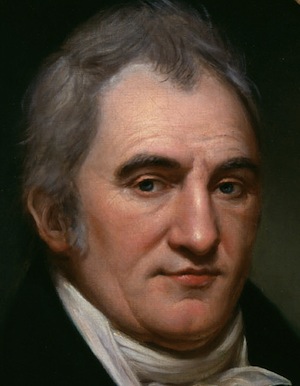Joel Barlow Signs The Treaty of Tripoli
Joel Barlow was a Renaissance man in the Age of Enlightenment.
Barlow was a poet who held several international positions during America’s early years.
Joel Barlow
Joel Barlow was a student at Yale when the Revolutionary War began.
Barlow split his time between his studies and the Revolution, notably serving in the Battle of Brooklyn. Upon graduation, he joined the Continental Army as a Chaplain.
After the war, Joel returned to Connecticut where he held various jobs before passing the bar and starting a law practice. During this time, he joined several other men to form a literary club known as the Hartford Wits. This group would publish several American literary classics.
For his part, Barlow gained fame across the United States for his lengthy poem The Vision of Columbus.
Scioto Land Company
Shortly after Vision was published, Barlow accepted a job from William Duer as an agent of the Scioto Land Company.
Joel traveled to France to sell property on behalf of the Company. Scioto was a scam, however, and did not own the land it was selling.
While it is difficult to determine just how much Barlow knew regarding the fraudulent nature of this business, he did not seem to receive much criticism from his contemporaries.
France
While Barlow was still in France, the French Revolution broke out. Joel believed this was an extension of the American Revolution and actively supported the rebels.
Barlow, for his part, was one of the few Americans granted French citizenship. He was elected to the National Assembly, France’s Revolutionary Government.
After the Reign of Terror began Joel fled to London, but not before helping his friend Thomas Paine who had been imprisoned.
Consul to Algiers
Three years went by before Joel Barlow was appointed by President Washington as Consul to Algiers. In this office, he was expected to negotiate with the Barbary States.
Though technically a part of the Ottoman Empire, the Barbary States (Algeria, Tunis and Tripoli) were run as independent nations. Their navies were considered to be pirates by Europe for centuries, and hundreds of American sailors were being held prisoner.
Barlow was able to use his budgetary funds to pay bribes and free all of these Americans. He then signed the Treaty of Tripoli in an effort to prevent future attacks on United States merchant ships.
The Treaty of Tripoli
The Treaty of Tripoli was significant for one extremely telling line:
"…the Government of the United States of America is not, in any sense, founded on the Christian religion."
This was written to ensure the Muslims of North Africa that there would be no conflict between the two continents based strictly on religion.
While it might be easy to point at Barlow as one man who put his personal beliefs into the treaty, it is important to note that this was unanimously accepted by the United States Senate. Although most of the Founders were deeply religious men, the majority of them agreed that the best type of Republic is a secular one.
Minister to France
After returning to the United States for several years, Barlow was selected as the Minister to France.
Joel returned to Europe but due to the Napoleonic Wars was forced to travel extensively just to meet with France’s ambassador. During this trip he caught pneumonia and quickly passed away.
He was survived by his extensive writings, many of which were published posthumously.
If you would like to read about other Founders who served overseas, check out these articles on William Short and Silas Deane.
Joel Barlow actually has several biographies.I have read ‘American Diplomat and Nation Builder’ and enjoyed it thoroughly. The other ones may also be very good but I can’t speak to that. Pick up a copy of ‘American Diplomat’ through the Amazon affiliate link below.
If you are new to this site, make sure you subscribe to the email list for a new Founder every day.






